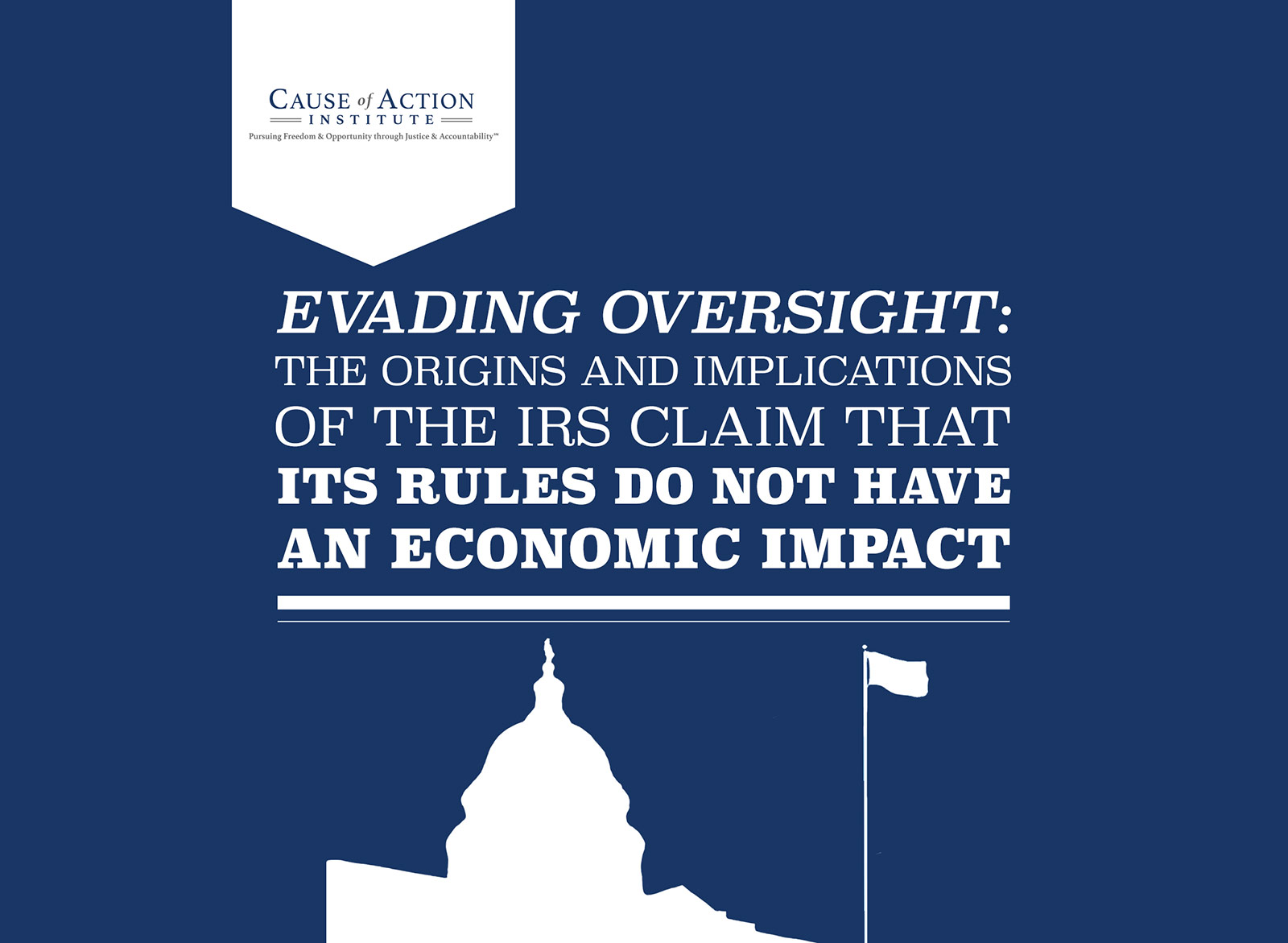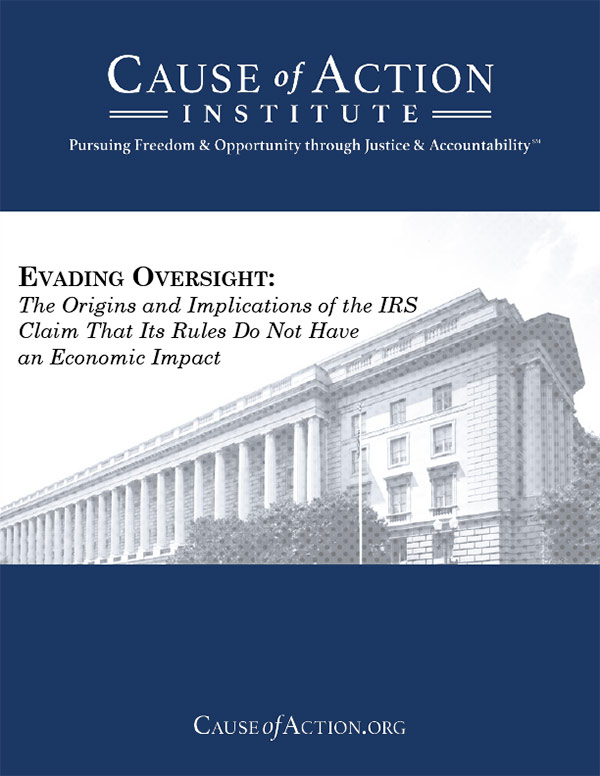
Updates:
- House Committee on Oversight and Government Reform sends letter with follow-up oversight questions after Treasury and OMB sign new agreement
- CoA Institute Blog: Oversight Victory: Tax Regulations Now Subject to OMB Review
- Senate HSGAC Hearing: Reviewing the Office of Information and Regulatory Affairs
- Treasury, OMB Update Tax Regulatory Review Process
- CoA Institute Blog: CoA Institute Files Amicus Brief in CIC Services v. IRS, Presents Findings from Evading Oversight Report
- Mulvaney nears victory in struggle with Mnuchin on tax rules, Nancy Cook & Aaron Lorenzo, Politico
- CoA Institute Blog: Evidence of Progress? IRS Submits Final Inversion Rule for White House OMB Review
- Press Release: Coalition Urges Trump Administration to End Unlawful IRS Practice of Dodging Oversight
- CoA Institute Blog: Treasury and OMB are Reconsidering IRS Oversight Exemption
- House Committee on Oversight and Government Reform send letter requesting IRS justifications for exemptions.
- CoA Institute Blog: Congress Investigates IRS for Trying to Evade Oversight
- Senators Ron Johnson and James Lankford open congressional investigation into IRS claims with oversight letters to OIRA and the IRS
- CoA Institute calls on Congress to press Chuck Rettig, nominee for IRS Commissioner, to reform practice
- John Vecchione and James Valvo launching the report, The Wall Street Journal
In The News:
- TaxProf Blog: Ari Glogower reviews Clint Wallace’s Centralized Review of Tax Regulations
- OMB and IRS Set New Parameters for Review, Dan Bosch, American Action Forum
- Top Trump Officials Reach Truce in Fight Over Tax Law’s Implementation, Alan Rappeport & Jim Tankersley, The New York Times
- Tax Rules Unlikely to Stall Under New Review Process: Officials, Allyson Versprille & Laura Davison, Bloomberg Tax
- OMB Will Review More Tax Rules, Richard Rubin, The Wall Street Journal
- How OIRA and Treasury can work together to improve tax regulation, Adam Looney, Brookings
- Excessive review of IRS laws delays needed government revenue, Eileen O’Connor, The Hill
- IRS Rulemaking Should Follow HHS Model, Susan Dudley, The Hill
- White House Turf Battle Threatens to Delay Tax Law Rollout, Alan Rappeport & Jim Tankersley, The New York Times
- OMB Hires Tax Experts as it Negotiates Rules Review With Treasury, Cheryl Bolen & Allyson Versprille, Bloomberg Tax
- Wonk Fight, Yuval Levin, National Review
- Treasury Rules, OMB Review, Bloomberg Daily Tax Report
- Why Does OMB Want Authority Over Tax Law?, Kevin Drum, Mother Jones
- OMB Review of IRS Regulations, Jim Tozzi, Center for Regulatory Effectiveness
- Mulvaney nears victory in struggle with Mnuchin on tax rules, Nancy Cook & Aaron Lorenzo, Politico
- Mark Everson and Mark Mazur defend IRS Exemption, Keep the White House away from the IRS, The Hill
- Conservatives push for new check on IRS rules, Naomi Jagoda, The Hill
- Politico Morning Tax: How Fast do we need? Regulatory Divide
- Americans for Tax Reform: IRS Evades Regulatory Accountability Through Self-Imposed Exemption From Oversight
- Politico Morning Tax: Coalition Urges End to Decades-Old IRS Exemption from White House Review
- Free-Market Groups: IRS rules shouldn’t be exempt from White House review, The Hill
- Tax law ignites White House power struggle, Nancy Cook & Aaron Lorenzo, Politico
- Two Former OIRA Administrators Join the Chorus: Susan Dudley & Sally Katzen, The Wall Street Journal
- Tax Regulations at Center of GOP Dispute, Richard Rubin, The Wall Street Journal
- Kim Strassel in The Wall Street Journal: Tax Reform and IRS Resistance
- National Taxpayers Union Urges Acting IRS Commissioner to Heed CoA Institute Report, Pete Sepp
- Jenny Beth Martin in The Hill: IRS evading federal rules, Trump can get agency on track
Introduction:
A tension exists in federal administrative law. Agencies are tasked by statute with executing delegated functions, and the president is assigned by the Constitution to head the Executive Branch and take care that laws are faithfully executed. This creates tension because agencies can make controversial, burdensome, unwise, or unaccountable decisions that may conflict with statutory mandates or the president’s chosen governing course. This tension has heightened over the past one hundred years as the size and scope of the administrative state has dramatically increased. Disputes over how to control administrative agencies and the validity of their actions have also sharpened during the same period.
In an attempt to alleviate these tensions, Congress and the president have installed various regulatory-oversight mechanisms. The mechanisms, embodied in statutes and executive orders, seek to mitigate the worst agency abuses, while also reinjecting constitutional actors into the agency decision-making process. When agencies act to subvert these oversight mechanisms, they undermine legitimate checks on their power and raise concerns about the propriety of their decisions, thereby exacerbating concerns about lack of control over the administrative state.
The Internal Revenue Service (“IRS”) is one such agency. It has systematically constructed a series of exemptions from certain aspects of three important oversight mechanisms: the Regulatory Flexibility Act, White House review pursuant to Executive Order 12,866, and the Congressional Review Act. The IRS purports to base these self-made exemptions on the claim that any economic impact of the rules that it issues flows from the underlying statute and is not attributable to its regulatory actions, for the purpose of triggering economic impact analyses and information sharing under these three oversight mechanisms. The agency, however, has not provided any detailed, public explanation to justify its position. Further, the IRS position, if correct, would apply to any regulation promulgated by any agency, as hopefully all regulations are based on a statute.
All three oversight mechanisms are designed to: (1) increase information sharing between agencies and the constitutional actors that oversee their actions, and (2) disclose to the public the economic significance of agency decisions. By claiming an exemption from these mechanisms, the IRS is denying Congress, the president, and the public important information about how IRS rules impact the economy and how different administrative choices could alleviate that impact.
Key Findings:
- Finding #1: In the three sections of the Internal Revenue Manual that govern the IRS approach to compliance with three important regulatory oversight mechanisms, the agency claims that its regulations have no economic impact because any such impact is attributable only to the underlying statute.
- Finding #2: The agency asserts that its regulations have no economic impact to claim self-bestowed exemptions that allow it to avoid economic impact analyses and the sharing of information with the White House, Congress, and the public. The IRS has provided no detailed, public explanation to justify its position.
- Finding #3: The IRS first claimed that its regulations have no economic impact to evade a congressional amendment to the Regulatory Flexibility Act that was explicitly designed to cover IRS regulations.
- Finding #4: Over time, the agency has expanded its self-bestowed exemption to avoid a greater number of regulatory-oversight mechanisms. The exemption first applied only to the “revenue impacts” of IRS regulations but is now claimed for all “effects.” In addition to avoiding the requirement of the Regulatory Flexibility Act, the IRS also applies its exemption in the context of White House Office of Information and Regulatory Affairs review and the Congressional Review Act. The IRS has provided no detailed, public explanation to justify these expansions.
- Finding #5: The combination of the IRS assertion that its rules do not create an economic impact and a 1983 memorandum of understanding between the White House and the Department of the Treasury has created a moral hazard that allows the IRS to determine which rules it sends to the White House for pre-publication review, as required under Executive Order 12,866 and its progeny.
